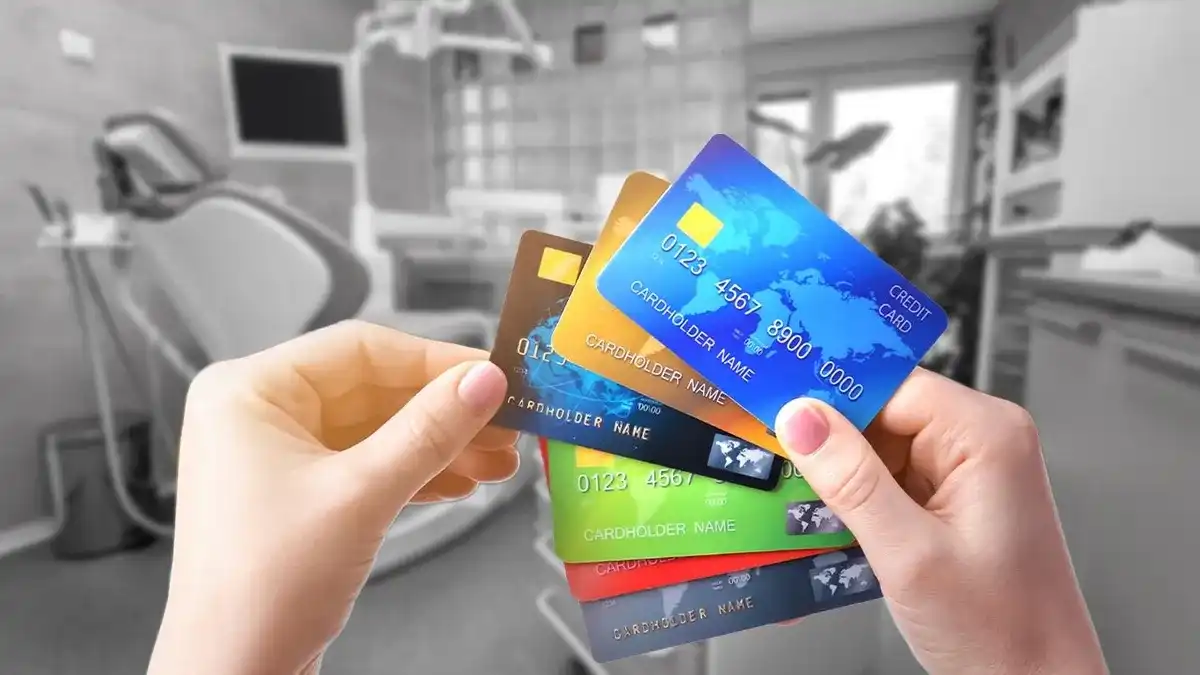Are Dental Credit Cards a Good Idea for Dental Work?


If you absolutely need to have a tooth repaired or something major done to your smile, should you pay for it with your credit cards? What if it’s “just” something you want, like dental veneers or Invisalign? For dental work, you might actually have a few better dental financing options than whipping out your emergency credit card: low or 0% interest credit cards for dental work. But if you are tight on cash for dental procedures – getting a dental credit card can make your financial situation worse!
Are Dental Credit Cards A Good Idea?
Using your credit cards for dental work can get really tricky if you go over your limit, or expensive with interest rates being applied. But there are actually some affordable, credit cards out there to choose from. These 3rd party financing platforms can be used to pay for any dental procedure. Whether it’s medically necessary like a root canal or totally elective like dental veneers.
People gravitate toward credit cards like CareCredit. It’s not just a credit card for dental work; some people will even use their CareCredit account for other medical expenses when their health insurance doesn’t cover them.
If know you're able to pay off the balance in full within that period, a dental or medical credit card might be a good choice for your situation.
PRO TIP: If you have a good credit score, check out credit cards that offer a true 0% APR where your card is interest-free for up to 24 months without interest secretly building up!
What Can I Use a Dental Credit Card For?
Any treatment. Absolutely anything.
- Braces
- Root canals
- Dental veneers
- Dental implants
- Teeth whitening
- Cosmetic dentistry and more
Credit cards cover medical, optical, and other things too. But in the sense of using credit cards, nothing is off limits; they can be used on any dental procedure, unlike your dental insurance policy.
In most scenarios, people get these credit cards for dental work that is elective or exceeds their insurance benefits. Maybe it’s something like an emergency root canal and crown that can’t wait. Or it’s gifting yourself a smile makeover because you can’t stand hiding your teeth any longer.
Related: 6 Best Dental Credit Cards for Dental Work
How to Get a Dental Credit Card
If your dentist accepts credit cards for dental work, they’ll usually have a brochure in their office or an application form on their website. You simply fill out the application to the 3rd party dental financing company, and CareCredit or whichever platform it’s through will run your information through their system. Some types of dental credit cards run credit checks while others don’t.
Usually, you’ll get instant approval right there on the spot. That means you can schedule your dental work on the same day without waiting for a card in the mail or time to set aside extra cash.
It's a good idea to shop around for the best deal for credit cards for dental work or a personal loan.
Should You Apply For A Dental Credit Card?
If you’re unsure whether or not it’s smart to take out dental credit cards for your necessary or upcoming dental work, here are some scenarios where dental financing with a credit card is a good choice:
- You have necessary treatment that you can’t afford completely out of pocket
- Delaying dental work would cause your treatment costs to increase
- You’re planning a major transformation, like a smile makeover or full-arch implants
- There’s a dental emergency involved
- Treatment needs to begin immediately because of a severe infection or pain
- The credit cards for dental work have low or 0% interest rates
- You can afford the modest monthly payments
- You want elective procedures that will enhance your lifestyle but aren’t covered under insurance
- You know you can pay the balance off before the interest kicks in
- The dental credit cards offer 6-12+ months of no-interest financing
- An unexpected dental surgery doesn’t fit into your budget
- Investing in a better long-term option is financially smarter, even if it costs more upfront
Should You Use a CareCredit Card?
If you are absolutely sure you can pay off your balance within the promotional period, you can still financially benefit from options like CareCredit. Since CareCredit offers deferred interest on your dental care, you can enjoy 0% interest financing for up 24 months. Some people qualify for more or less time than that, depending on their credit history.
You’ll want to note that CareCredit is a deferred interest dental financing option. Deferred interest means you pay no interest for a set promotional period. If the balance is not paid in full by the end of the promotional period, even if it's a dollar, you will be responsible for all the interests that added up from the start.
Zero-interest dental financing is tricky, but they are a good option if you absolutely know you can pay off the balance within the promotional period or if you have bad credit.
How to Use a 0% Intro APR Credit Card for Dental Work
If you’re waffling between which type of credit card to use for dental work, it’s worth noting that people who have good or excellent credit scores can usually qualify for a 0% introductory APR. So, if you’re thinking about earning points toward airfare, a trip to Disney, or something else, your traditional credit card can serve a dual purpose.
Unlike dental credit cards like CareCredit, 0% APR introductory credit cards won’t make you pay for the deferred interest. It’s different because the interest doesn’t kick in until your introductory period is over. Instead, you “just” pay interest on any balance that’s left on your card after the introductory period has ended.
The biggest benefit of using dental credit cards is taking advantage of the number of months where you can get 0% interest. If one card offers you a term of 6 months and another offers 12 or 18 months, and you know you can pay off the balance without any fees, you might as well take advantage of the one with the longer payoff period for lower monthly payments.
Alternatives To Dental Credit Cards
For example, if your dentist recommends a crown, but you wait several months to save up some extra cash, you might need a root canal AND a crown by that point. Being proactive about getting your dental work scheduled saves you time and money.
Here are some ways to save or make your care more accessible:
1. Cards With A True 0% Introductory Period
With your 0% interest introductory period, you don’t have to worry about interest accumulating and compounding on itself the longer you wait to pay off your balance. If you extend your payments past the interest-free period you will only pay interests on the remaining balance. You’ll also save money by treating your dental concerns as early as possible.
2. Dentists With Payment Plans
You won’t always find this option available, but if your dental office doesn’t accept CareCredit or other dental credit cards, they may offer an in-house payment program. Depending on the office, the terms will vary. Some require a 50% down payment and three monthly installments or the remaining amount at the final appointment. Or they’ll ask to do a monthly draw on your checking account. Typically, dental offices offer payment plans on an as-needed basis and do not advertise them. If you’ve been seeing your dentist for several years already and have never carried a balance due for your dental care, they may be more receptive to offering you a private payment plan.
3. Payment Plans Through Your Card Issuer
If you’re taking out a personal credit card or already have one that you want to use toward your dental expenses, you can talk with the carrier to negotiate your monthly payment amount. Even if a minimum payment is listed, there may be some wiggle room.
4. Personal Loans
Sometimes it’s easier to take out a small personal loan from your bank or a credit union to cover your dental expenses. This option works well for people with lower credit scores, who only qualify for high-interest dental credit cards.
5. Dental Schools
Do you live anywhere close to a dental school? They need patients, too! Dental students are excellent care providers because they’re being closely monitored by their professors and need to perform impeccable care, whatever the dental procedures may be. Dental school treatments cost a fraction of what you’d pay in a private dental practice.
6. Cash
Ask your dentist if they offer a cash discount. Many practices will automatically reduce your fees by 5% if you’re paying for the service in full at the time of treatment.
How to Pay for Dental Care with Bad Credit
Navigating your dental bill with bad credit score can be challenging, but it’s not impossible. Again, one excellent option is to look into a private personal loan as the interest rate will probably be much less than that of a credit card. Avoid your bad credit score completely by exploring options like visiting a dental school, payment plans through your dental office or finding a public dental health clinic in your area.
Dental Financing With Credit Cards
Using credit cards for dental financing is extremely common. That’s why low, and "no interest" options like CareCredit and similar platforms are so easy to sign up for. When you need medically necessary care that isn’t covered by insurance—or you want elective services like a smile makeover—dental financing and dental credit cards are a great solution.
You don’t have to wait on getting dental procedures and you only have to make low monthly payments on your balance. In most cases, you have up to 6, 12, or even 18 months to pay off your balance before interest payments kick in. Just be sure to shop the interest rates and determine if they’re deferred, or a true 0% intro APR credit card. If you’re at risk of delaying the dental work you need, explore dental school or clinic options or ask your dentist’s office about an in-house payment plan.

Make your inbox smile!
Subscribe






